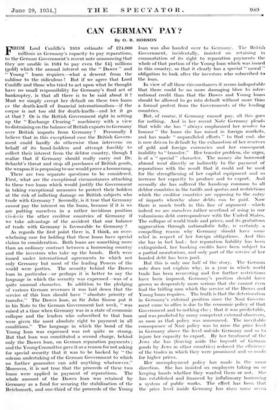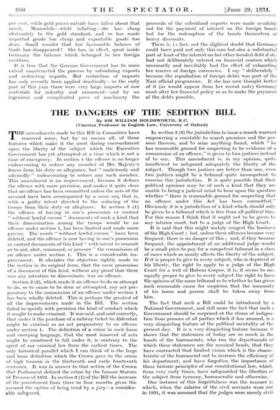CAN GERMANY PAY ?
By 0. R. HOBSON
FROM Lord Cunliffe's 1919 estimate of £24,000 millions as Germany's 'capacity to pay reparations, to the German Government's recent note announcing that they are unable in 1934 to pay even the 141 millions (gold) which the annual interest on the " Dawes " and "'Young " loans reqUires—what a descent from the sublime to the ridiculous ! But if we agree that Lord Cunliffe and those who tried to act upon what he thought have no small' responsibility for Germany's final act of bankruptcy, is that all there is to be said about it ? Must we simply accept her default on these two loans as the death-knell of financial internationalism—if the corpse is not too old for death-knells—and let it go at that ? Or is the British Government right in setting up the " Exchange Clearing " machinery with a view to distraining on the balance of British exports to Germany over British imports from Germany ? Personally I believe that in, this exceptional case the British Govern- ment could hardly do otherwise than intervene on behalf of its bond-holders and attempt forcibly to collect their interest from the debtor country, though I realize that if Germany should really carry out Dr. Schacht's threat and stop all purchases of British goods, the weapon it is proposing to use would prove a boomerang.
There are two separate questions to be considered. First, what are the exceptional circumstances attaching to these two loans which would justify the Government in taking exceptional measures to protect their holders at the risk of inflicting damage on British subjects who trade with Germany ? Secondly, is it true that Germany cannot pay the interest on the loans, because if it is we are putting ourselves in a rather invidious position vis-a-vis the other creditor countries of Germany if we take advantage of the accident that our balance of trade with Germany is favourable to Germany ?
As regards the first point there is, I think, an over- whelming case for holding that these loans have special claims to consideration. Both loans are something more than an ordinary contract between a borrowing country and the investors who take up the bonds. Both were issued under international agreements to which not only Germany but most of the leading Powers of the world were parties. The security behind the Dawes loan in particular—or perhaps it is better to say the language in which the security was expressed—was of a quite unusual character. In addition to the pledging of various German revenues it was laid down that the service of this loan should have " absolute priority of transfer." The Dawes loan, as Sir John Simon put it in his Note to the German Government last week, " was raised at a time when Germany was in a state of economic collapse and the lenders who subscribed to that loan were given, the most absolute right to Payment in all conditions." The language in which the bond of the Young loan was expressed was not quite so strong. But that loan was constituted a second charge, behind only the Dawes loan, on German reparation payments and the Young Committee gave it as a reason for not asking for special security that it was to be backed by " the solemn undertaking of the German Government to which no further guarantee can add anything whatsoever." .Moreover, it is not true that the proceeds of these two loans were applied in payment of reparations. The ,whole amount of the Dawes loan was retained by Germany as a fund for securing the stabilization of the Reichsmark, and one-third of the proceeds of the Young loan was also handed over to Germany. The British Government, incidentally, insisted on retaining in commutation of its right to reparation payments the whole of that portion of the Young loan which was issued in this country, so that it clearly has a special " moral " obligation to look after the investors who subscribed to the loan.
In view of all these circumstances it seems indisputable that there could be no more damaging blow to inter- national credit than that the Dawes and Young loans should be allowed to go into default without more than a formal protest from the Governments of the lending countries.
BUt, of course, if Germany cannot pay, all this goes for nothing. And in her recent Note Germany pleads that 'while she has " alWays emphasized her resolve to honour " the loans she has raised in foreign markets, and has made " unparalleled efforts " to that end, she is now driven to default by the exhaustion of her reserves of gold and foreign currencies and her consequent inability to " transfer." Her transfer problem, she urges, is of a " special " character. The money she borrowed abroad went directly or indirectly to the payment of reparations with the result that it could not be used for the strengthening of her capital equipment and so increase her capacity to produce and to export. And secondly she has suffered the handicap common to all debtor countries in the tariffs and quotas and restrictions which the creditor countries are opposing to the entry of imports whereby alone debts can be paid. Now there is much truth in this line of argument—which indeed we are ourselves rather overfond of using in our voluminous debt correspondence with the United States. The collapse of world trade and prices, and its gratuitous aggravation through nationalistic folly, is certainly a compelling reason why Germany should have some relief in respect of her foreign obligations. And this she has in fact had : her reparation liability has been extinguished, her banking credits have been subject to a partial moratorium, and only part of the service of her bonded debt has been paid.
But this is only one half of the story. The German note does not explain why, in a year in which world trade has been recovering and few further restrictions have been imposed, Germany's position should have grown so desperately more serious that she cannot even find the trifling sum which the service of the Dawes and Young loans requires. The truth is that the deterioration in Germany's external position since the Nazi Govern- ment came to office is due to the economic policy of that Government and to nothing else ; that it was predictable, and was predicted by many competent external observers, as soon as that policy was announced. The inevitable consequence of Nazi policy was to raise the price level in Germany above the level outside Germany and so to injure her capacity to export. By her treatment of the Jews she has (leaving aside the boycott of German goods by Jews in other countries) reduced the efficiency of the trades in which they were prominent and so made for higher prices.
Her unemployment policy has made in the same direction. She has insisted on employers taking on or keeping hands whether they wanted them or not. She has established and financed by inflationary borrowing a system of public works. The effect has been that the price level inside Germany has risen some seven per cent, while gold prices outside have fallen about that much. Meanwhile—while inflating—she has clung obstinately to the gold standard, and so has made imported goods too cheap and exportable goods too dear. Small wonder that her . favourable balance of trade has disappeared ! She has, in effect, spent inside Germany the balance which belonged to her foreign creditors.
It is true that the German Government has to some extent counteracted the process by subsidizing exports and restricting imports. But restriction of imports has only recently been applied drastically—in the early part of this year there were very large imports of raw materials for industry and armament—and by an ingenious and complicated piece of machinery the proceeds of the subsidized exports were made available not for the payment of interest on the foreign bonds but for the redemption of the bonds themselves at heavy discounts.
There is, is fact, not the slightest doubt that Germany could have paid not only this sum but also a substantial part at least of the interest on her other bonded debt if she had not deliberately entered on financial courses which necessarily and inevitably had the effect of exhausting her reserve of foreign currencies. I say " deliberately " because the repudiation of foreign debts was part of the Nazi official programme. If she has now thought better of it (as would appear from her recent note) Germany must alter her financial policy so as to make the payment of the debts possible.





































 Previous page
Previous page